Realizing Children’s Rights in Cape Verde
Cape Verde is one of the Small Island Developing States or SIDS. The country has made major advances with regard to children’s rights. However, the limited resources of both the country and its population hamper the implementation of measures to ensure and strengthen respect for children’s rights. The country still has many challenges to overcome, but the government’s willingness makes it possible to envision a better future for Cape Verdean children.
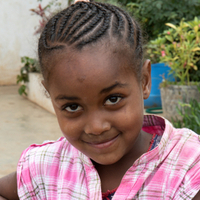
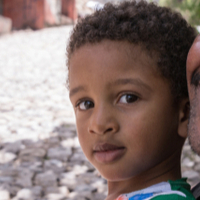

Children’s Rights Index: 7,89 / 10
Orange level: Noticeable problems
Population: 543,767
Pop. ages 0-14: 28.7%
Life expectancy: 72.7 years
Under-5 mortality rate: 14.9‰
Cape Verde at a glance
Cape Verde is an island state. Composed of ten volcanic islands, this West African republic is known for its political stability after gaining its independence on July 5, 1975. It is one of the most dynamic countries on the African continent, with encouraging development indicators. With good governance and a low level of corruption, Cape Verde has a GDP per capita three times higher than the sub-Saharan African average. According to the Human Development Index ranking, it was the top country in West Africa and was placed 13th among African countries in 2019. Globally, it is ranked 163rd out of 228 (Direction générale du Trésor, 2020).
The archipelago is lacking in natural resources, especially fresh water, and suffers from long periods of drought (Comité pour l’élimination de la discrimination raciale, 2003). This situation is a real challenge, as Cape Verde is a country that is dependent on the outside world for its financial resources, as well as for its domestic needs. For example, as only 10% of the country is arable land, it must import 85% of its food needs (Direction générale du Trésor, 2020). Divided into several islands and with its resource concerns, it is difficult for Cape Verde to provide essential services (Comité pour l’élimination de la discrimination raciale, 2003).
Status of Children’s Rights [1]
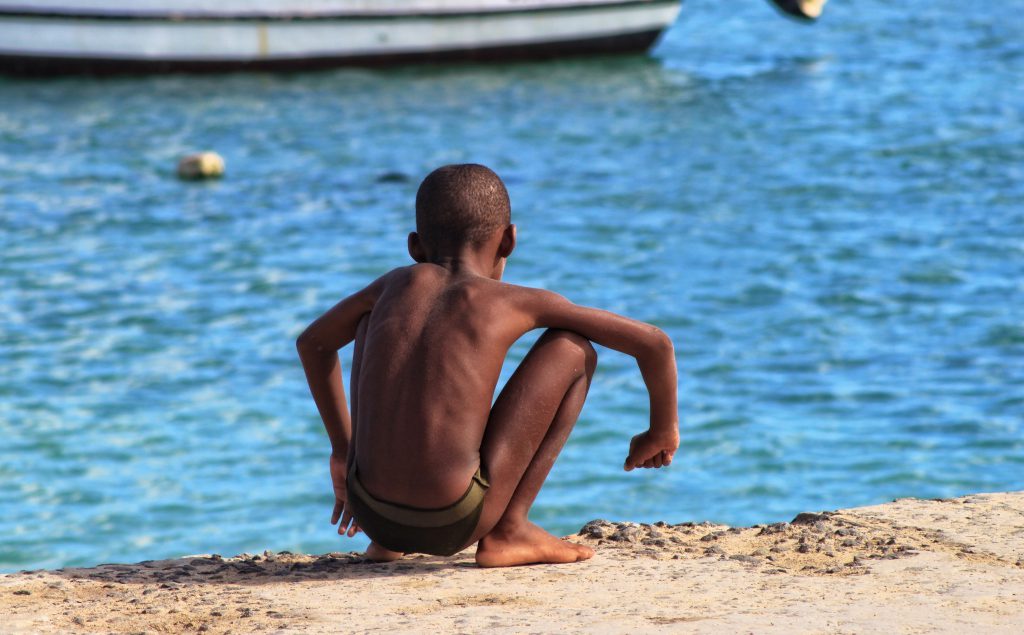
Regarding children’s rights, the country has made many efforts to improve the situation for a number of years. At a global level, Cape Verde has demonstrated its willingness through its accession to and/or ratification of international agreements. For example, Cape Verde signed both the International Labour Organization’s Minimum Age Convention of 1973 and the Worst Forms of Child Labour Convention of 1999 on February 7, 2011 (Comité pour la protection des droits de tous les travailleurs migrants et des membres de leur famille, 2015).
These two ratifications are in addition to the ratification of the International Convention on the Rights of the Child (CRC) on June 4, 1992. Furthermore, Cape Verde ratified the Optional Protocols to the Convention on the Sale of Children, Child Prostitution and Child Pornography, and the Optional Protocol on the Involvement of Children in Armed Conflict in 2002. In order to implement the CRC, legislative initiatives have been taken, notably the creation of the National Commission for Human Rights and Citizenship in 2004 and the adoption of the Child and Adolescent Statute in 2013 (Comité des droits de l’enfant, 2019).
The country and its successive governments are therefore aware of the importance of children’s rights and efforts have been made in the right direction. However, few human, technical, and financial resources are allocated to policy and legislative measures in order to ensure full respect for children’s rights (Comité des droits de l’enfant, 2019). For example, the Child and Adolescent Statute is difficult to implement, which severely limits its scope (Comité des droits de l’enfant, 2019).
Cape Verde therefore still has some progress to make, in particular in order to address the guiding principles of the CRC. For example, this 2013 statute does not take into account the principle of respect for the opinion of the child in many aspects, and yet this is a guiding principle of the CRC. Training for professionals and campaigns to raise awareness of and promote children’s rights would make these rights more effective and anchor them in the practices and customs of society (Comité des droits de l’enfant, 2019).
At the same time, understanding and improving the situation is difficult, as little data and little monitoring of public policies exists. Reports on Cape Verde from various United Nations organizations, such as the 2019 report by the Committee on the Rights of the Child, regularly mention this lack of data. The 2019 report mentions the creation of an Observatory for Children and Adolescents, which would establish a data system that would make it possible to monitor the development of the rights set out in the CRC (Comité des droits de l’enfant, 2019).
Addressing the Needs of Children
Right to education
In Cape Verde, children have access to free and compulsory education for 8 years (Comité des droits de l’enfant, 2019). In addition, the enrollment rate has increased, rising from 63.5% in 2000 to 85.3% in 2010, according to the Cape Verdean Ministry of Education. We can see the same pattern in the literacy rate (Pires Ferreira, 2013). Almost all children have access to primary education and education makes up a large portion of the public budget (Comité des droits de l’enfant, 2019).
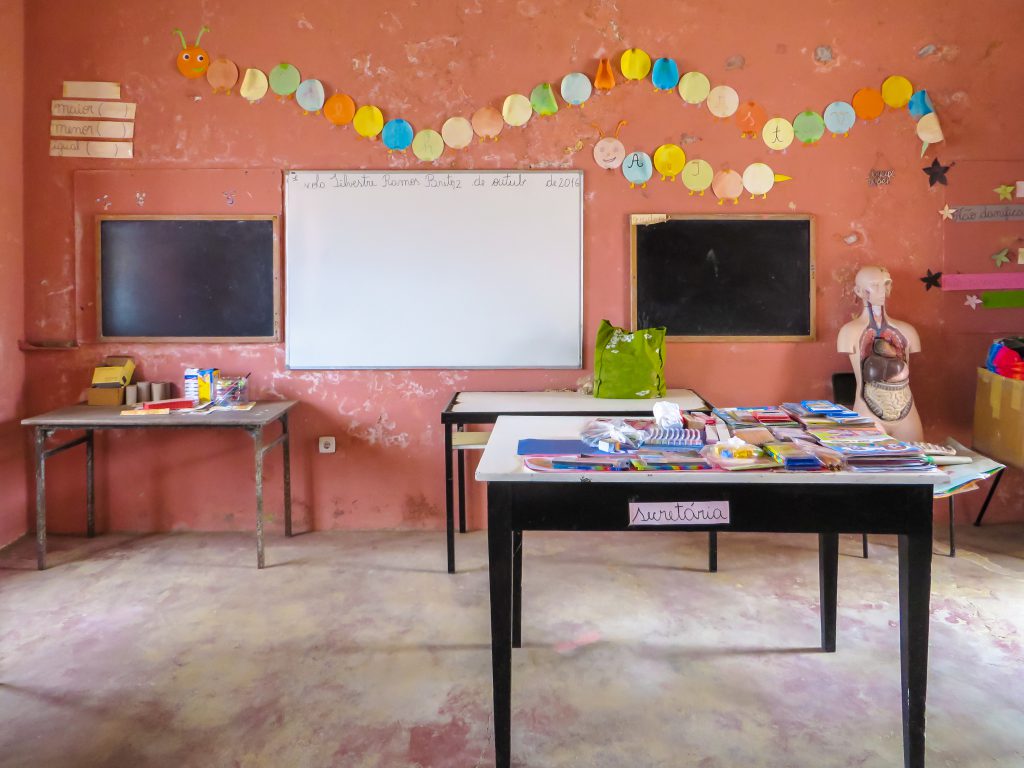
However, there are obstacles to children’s access to education. For example, although primary education is free, indirect costs such as transportation and children’s meals are significant for low-income families (Comité des droits économiques, sociaux et culturels, 2018). Secondary and university education are subject to fees. There are strong disparities between urban and rural areas among all social classes (Comité des droits de l’enfant, 2019). Although efforts have been made, education for children with disabilities remains very limited (Comité des droits économiques, sociaux et culturels, 2018).
In addition, education is an area which crystallizes identity and national issues: for example, teaching takes place in Portuguese. However, Cape Verdean Creole is used by much of the population, especially low-income social classes. Cape Verde is a good example of diglossia, or “a situation of bilingualism in an individual or a community in which one of the two languages has an inferior socio-political status” (Larousse, s.d.) – the official language in this case being Portuguese. The issue of the national language versus the official language constitutes a real obstacle to the right to education. As such, the dissemination of knowledge becomes much more difficult and students can find themselves in difficulties, especially those who speak Creole (Pires Ferreira, 2013).
The quality and relevance of education provided was even questioned by the Committee on the Rights of the Child in 2019. These difficulties and the ineffectiveness of the education provided are coupled with a high dropout rate. This trend particularly affects female students, despite legislative reforms that allow pregnant girls to continue studying (Comité des droits économiques, sociaux et culturels, 2018). Girls are also poorly represented in fields of study traditionally dominated by men (Comité pour l’élimination de la discrimination à l’égard des femmes, 2019). The curricula also contain a lot of discriminatory stereotypes about the supposed place of women and men within society and within the family (Comité pour l’élimination de la discrimination à l’égard des femmes, 2019).
Right to health
Progress is clear. Infant and maternal mortality rates have dropped drastically and a government budget has been allocated to help finance the children’s health service (Comité des droits de l’enfant, 2019). However, the right to health is far from fully secure and respected. Many diseases affect children, including diseases that have known vaccines, such as polio. Young children are particularly affected by this disease, as well as by perinatal conditions, acute respiratory infections, diarrheal diseases, goiters, and tuberculosis (Comité des droits de l’enfant, 2019).
Progress has also been made in adolescent health, notably with the creation of adolescent sexual and reproductive health services in 2008. However, many girls become pregnant (Comité des droits de l’enfant, 2019) with 12% of adolescent girls aged 15 to 19 in 2018 having already given birth to a child (Comité pour l’élimination de la discrimination à l’égard des femmes, 2019). Motherhood can endanger their future, for example by limiting access to education or to a better socio-professional situation (OMS, 2020).
Good nutrition has a positive impact on health. More Cape Verde children have enough to eat, as the low rates of children who are underweight or who suffer from undernutrition and stunting highlight (Comité des droits de l’enfant, 2019). However, anemia is very common among young children and pregnant women (Comité des droits de l’enfant, 2019). In addition, 25% of the rural population does not have access to safe drinking water and 35% of rural dwellings do not have a toilet or sewage disposal system (Comité pour l’élimination de la discrimination à l’égard des femmes, 2019). Unsafe drinking water and access to poor sanitation services are causes of illnesses affecting children (OMS, 2019), who nevertheless have the right to safe drinking water.
Beyond physical health, little information and support is available on mental health, especially that of children. The country could not provide any information on the causes of suicides among children and adolescents (Comité des droits de l’enfant, 2019). Drug use is widespread and even affects children under the age of 15 (Comité des droits de l’enfant, 2019) .
Right to identity
A major effort has been put in place for birth registration. The right to an identity requires this administrative practice, which allows a child to be associated with a country and with a nationality. The child thus obtains rights and protection. For example, without registration at birth, the child may be denied services, such as education. They are also more likely to be a victim of human trafficking, exploitation, forced labor, or illegal adoption (UNHCR Genève, 2015).
The topic of birth registration nevertheless shows the difficulties that this country has to overcome in terms of meeting the needs of its population and of its geography. Many births remain invisible to the eyes of rural administrations due to the lack of services and the lack of available resources (Comité des droits économiques, sociaux et culturels, 2018). Statelessness is a problem that still affects many children (Comité des droits de l’enfant, 2019).
The right to an identity also concerns migrant children. However, migrants from West Africa find it difficult to register the births of their children, who therefore do not have access to the health and education systems, and access to a nationality is also difficult for them (Comité des droits de l’enfant, 2019). These children are particularly vulnerable to abuse and exploitation, especially when they come from families with irregular immigration status (Comité des droits de l’enfant, 2019).
Risk Factors -> Country-Specific Challenges
Childhood Violence and Abuse
Violence and abuse against children in Cape Verde remains a persistent problem. Within the familial sphere, corporal punishment remains very widespread. However, this is detrimental to the well-being and development of children. Moreover, this practice is not explicitly prohibited in all situations (Comité des droits de l’enfant, 2019). Despite the creation of a protection system, many cases of abuse are reported. The lack of monitoring of abusers and child victims makes it all the more difficult to find relevant and effective solutions (Comité des droits de l’enfant, 2019).
Many cases of sexual violence are reported, mostly perpetrated by members of the family or relatives. However, cases of sexual violence also occur in schools. School is considered to be dangerous by many students (Comité pour l’élimination de la discrimination à l’égard des femmes, 2019). Most cases of sexual abuse affect girls (Comité pour l’élimination de la discrimination à l’égard des femmes, 2019).
Despite the establishment of the National Program to Combat Sexual Violence against Children and Adolescents 2017-2019 in 2016 (Comité pour l’élimination de la discrimination à l’égard des femmes, 2019), Cape Verde has few services to provide social, psychological, medical and legal support to child victims of such crimes (Comité des droits de l’enfant, 2019). Reporting violence to the authorities is also not obligatory by law (Comité des droits de l’enfant, 2019). Children are therefore vulnerable to exploitation in a climate of exacerbated violence (Comité des droits de l’enfant, 2019).
In addition, cases of police violence against children, especially those living on the streets, have been highlighted in the 2019 report by the Committee on the Rights of the Child, highlighting the impunity of the police despite their extrajudicial actions (Comité des droits de l’enfant, 2019). Reducing violence is a real challenge for Cape Verde to ensure the right to protection for children, given that the media and the political class seem to tolerate these practices. Even government officials resort to violence themselves.
The punishment of violent actions is an important dimension of our societies. Children who break the law should be tried but should receive punishments in accordance with their age and the severity of the crime. Like adults, they have rights that must be respected. In Cape Verde, the minimum age of criminal responsibility is now fixed at 16. However, from 12 years old, children can be subjected to socio-educational measures, and custodial sentences are unfortunately the most common punishment used for children aged 16 and over. Children are regularly put in cells with adults, which is against article 37 of the CRC. In addition, they do not have systematic access to support, advice, or complaint mechanisms (Comité des droits de l’enfant, 2019).
Child Labor
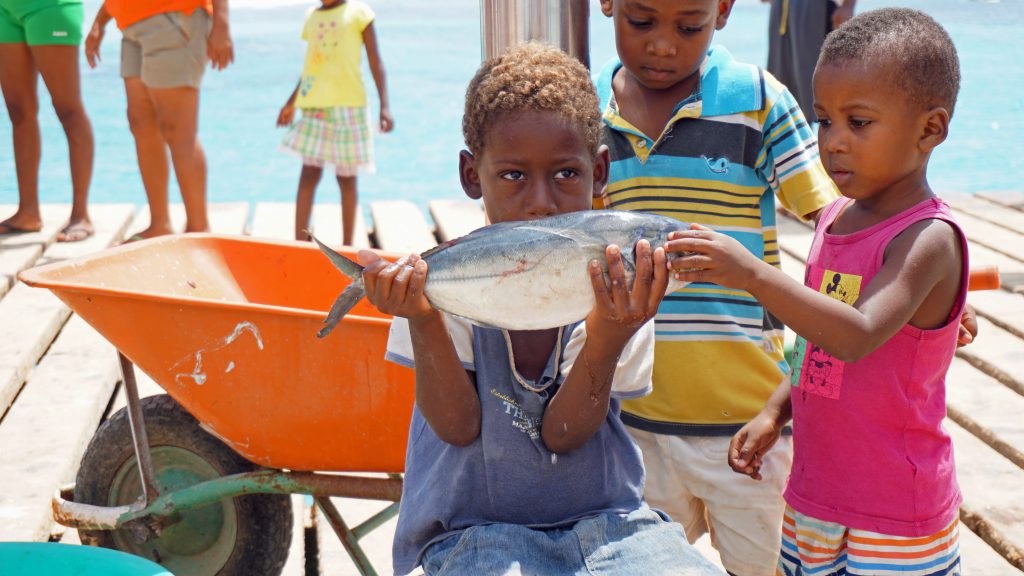
Cape Verde is a country with a high percentage of families living in poverty. This vulnerability affects many children, weakening their rights. The CRC regulates child labor and states that it must not endanger a child’s education. However, their vulnerable situation forces some parents to withdraw their children from the school system so that they can be used as a source of income (Comité des droits économiques, sociaux et culturels, 2018).
Cape Verde is making some progress, in particular by setting the minimum age of employability at 15 years. In 2014, it adopted the Action Plan for the Prevention and Elimination of Child Labor (Comité des droits de l’enfant, 2019). However, many children do work and take part in hazardous activities in various areas such as agriculture, fishing, and housework. This particularly affects children from rural areas (Comité des droits de l’enfant, 2019).
Prostitution and Sexual Tourism
Cape Verde, by virtue of its geographical position, was long a hub for triangular trade (Semedo, 2016). Even today, it retains a major role in human trafficking. It is a country of origin, country of passage, and country of destination for this illegal practice, which heavily impacts children. Human trafficking has been a criminal offense since 2015 in Cape Verde and a National Plan to Combat Human Trafficking has been implemented for 2018-2021 (Comité pour l’élimination de la discrimination à l’égard des femmes, 2019). However, little information is available to date to measure and monitor the procedures for the protection of child victims and the prosecution of perpetrators (Comité des droits de l’enfant, 2019).
Trafficking for the purposes of sexual exploitation and prostitution particularly affects women and girls in Cape Verde, with poverty and their vulnerable situation being risk factors (Comité pour la protection des droits de tous les travailleurs migrants et des membres de leur famille, 2015). It remains a major problem and Cape Verde has much to do in order to find effective solutions to prevent sexual exploitation and prostitution, which may increase due to the boom in tourism (Comité pour la protection des droits de tous les travailleurs migrants et des membres de leur famille, 2015). Recruiting and using children aged 16 to 18 for the purposes of prostitution and/or pornography is not officially prohibited and criminalized in Cape Verde (Comité des droits de l’enfant, 2019).
There are other equally worrying situations: in its 2019 report, the Committee on the Elimination of Discrimination Against Women expressed alarm at cases of families encouraging their daughters to prostitute themselves to American nationals in order to obtain a visa or to earn money. The Committee has also reported cases of girls, possibly as young as 12, who have been sexually exploited in exchange for drugs (Comité pour l’élimination de la discrimination à l’égard des femmes, 2019).
Gender Discrimination
Cape Verde is making progress as a society. For example, the Cape Verdean government adopted the Special Law on Gender-Based Violence in 2011, coupled with training and awareness measures (Comité des droits de l’enfant, 2019). Nevertheless, society remains patriarchal, minimizes the place of women and girls, and restricts their access to their rights. The Committee on the Rights of the Child mentioned in its 2019 report that gender stereotypes persist, in particular that of the traditional family model, with the mother taking care of the children. Discrimination against women and girls continues (Comité des droits de l’enfant, 2019). It has become extremely acute in Cape Verde, with many acts of gender-based violence (Comité des droits de l’enfant, 2019).
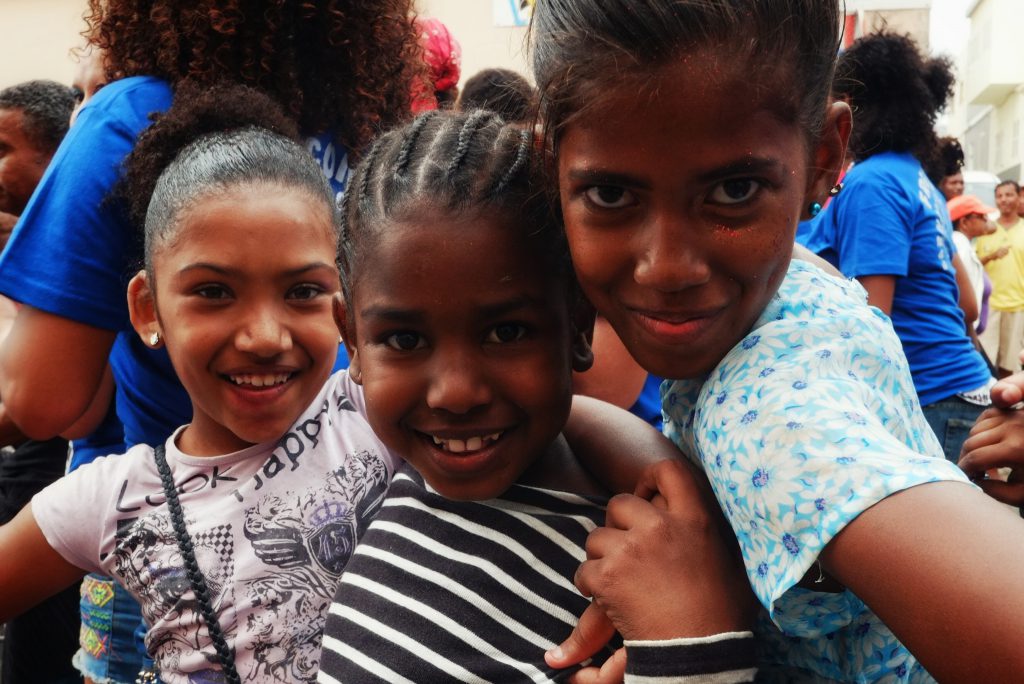
Although child marriage is considered a harmful practice, it is still possible for adolescents to marry with the consent of families (Comité des droits de l’enfant, 2019). Common-law marriages involving girls and adolescents under the age of 18 do exist. Common-law marriage involving children is a type of child marriage (Comité pour l’élimination de la discrimination à l’égard des femmes, 2019). Common-law marriages involving young women aged 19 are recognized by the Cape Verdean Civil Code if the couple have lived together for at least 3 years. Ultimately, these common-law marriages are legitimized for girls as young as 16 (Comité pour l’élimination de la discrimination à l’égard des femmes, 2019).
Environment and Children’s Rights
Climate change affects respect for children’s rights (UNICEF, 2007). People in Cape Verde, especially poor families, face repeated freshwater shortages and droughts (Comité des droits de l’enfant, 2019). As Cape Verde is an island state, it is affected by the rise in sea levels, as well as the rise in temperatures and changes in rainfall patterns (Comité des droits de l’enfant, 2019). However, little data exists and can be accessed in order to measure the effects of climate change on children’s rights.
Written by Juliette Bail
Translated by Latika Rodway-Anand
Proofread by Garen Gent-Randall
Last updated on September 8, 2020
Bibliography:
Cap-Vert. (2020, mars 17). Consulté en août 2020, sur PopulationData.net.
Comité des droits de l’enfant. (2019, juin 27). Observations finales concernant le deuxième rapport périodique de Cabo Verde. Récupéré sur Convention relation aux droits de l’enfant.
Comité des droits de l’homme. (2019, décembre 3). Observations finales concernant le rapport initial de Cabo Verde. Récupéré sur Pacte international relatif aux droits civils et politiques.
Comité des droits économiques, sociaux et culturels. (2018, novembre 27). Observations finales concernant le rapport inital de Cabo Verde. Récupéré sur Conseil économique et social des Nations Unies.
Comité pour la protection des droits de tous les travailleurs migrants et des membres de leur famille. (2015). Observation finales concernant Cabo Verde en l’absence de rapport.
Comité pour l’élimination de la discrimination à l’égard des femmes. (2019, juillet 30). Observations finales concernant le neuvième rapport périodique de Cabo Verde. Récupéré sur Convention sur l’élimination de toutes les formes de discrimination à l’égard des femmes.
Comité pour l’élimination de la discrimination raciale. (2003). Observation finales du Comité pour l’élimination de la discirmination raciale sur le Cap Vert. Examen des rapports présentés par les États parties conformément à l’article 9 de la Convention internationale sur l’élimination de toutes les formes de discrimination raciale.
Larousse. (s.d.). diglossie. Consulté en septembre 1er, 2020, sur Larousse.
OMS. (2019, juin 15). Eau. Consulté en septembre 2020, sur Organisation mondiale de la santé.
[1] This article in no way purports to give a complete or representative account of children’s rights in Cape Verde; indeed, one of the many challenges is the lack of up-to-date information on children. This article is mainly based on sources from the United Nations which warrant being corroborated with resources from other organizations.

